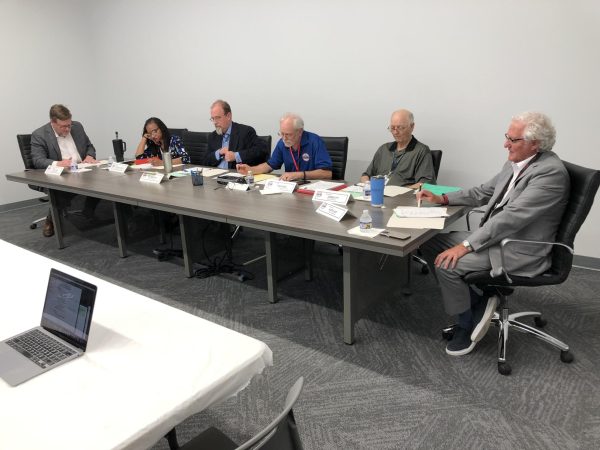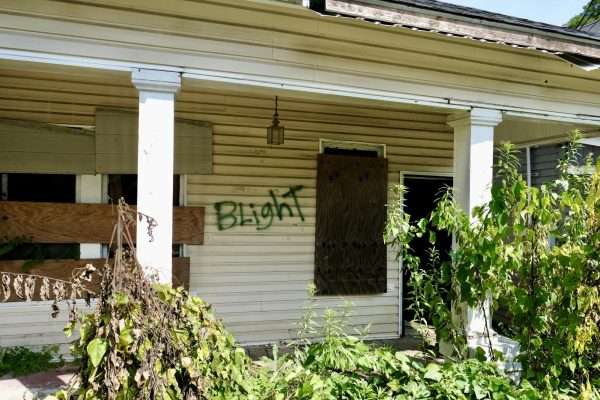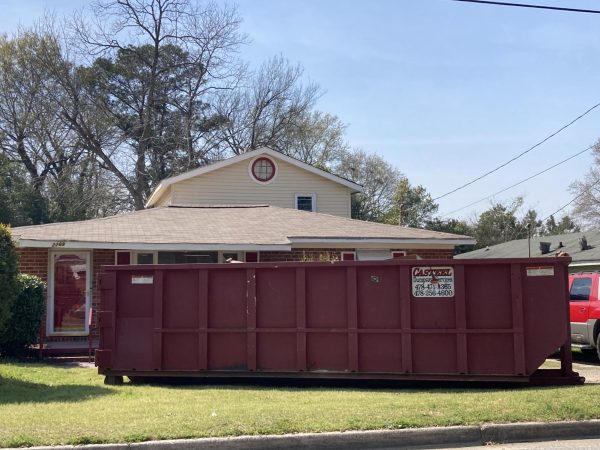How recent downtown developments are affecting Macon’s homeless
The closed down store front of what was Fashion Avenue now showcases “porta potties” and graffiti on Cherry Street in Macon. While Cherry Street is home to some of downtown’s most popular shops and restaurants, like Fresh Produce Records, Parish on Cherry, Retro Reboot Arcade and the Rookery, it still has not rebounded to its former success.
Last summer, Macon officials bulldozed a homeless encampment, displacing a large number of people who were living on Spring Street, off of Interstate 16. Residents of the encampment were forced to relocate, taking only what they could carry. Officials said the reason for the bulldoze was concern for the health and safety of those living there.
“You can see it and you can smell it: this is not a place people should be living,” Spencer Hawkins, Director of the Macon-Bibb County Emergency management Agency, said at that time in an interview with GPB.
Present to help alleviate the turmoil was Brookdale Resource Center, a temporary housing shelter run by the United Way of Central Georgia, who said they had enough beds for everyone who was displaced at the time, but there were other services available too, like Daybreak, a local day shelter for the homeless.
The United Way to End Homelessness, led by Rev. Jake Hall, wants to see change in the way things are done, creating a network out of the existing disconnected services.
Part of that, he said, was establishing a link between local businesses and getting community leaders, including local business owners, to help take a stand against homelessness.
“One of the good things about Macon-Bibb, speaking generally, is that our approach to addressing persons experiencing homelessness is a bit more holistic and compassionate than some other cities, which is a reassuring thing. Downtown businesses are formally connected to what I do through a growing kind of business leader council,” Hall said.
He said starting in October, he held gatherings with municipal workers, community members and business leaders who have a vested economic interest in public spaces downtown.
“They themselves are seeking to balance, the compassion that they feel towards folks who are experiencing homelessness and also its effect on public spaces,” Hall said of those stakeholders.
But that balance is difficult to maintain, especially with all the nuances and complications that come along with the issue of homelessness, Hall said. For downtown as a whole, the balance of compassion is expressed in multiple different ways. Organizations like Loaves and Fishes ministry on Martin Luther King Jr. Boulevard provides food. Wear on First Street is an arm of DePaul Ministries, which donates its profits to support Daybreak.
Other stores, like Hello Boba on Third Street and Frankie’s Boutique on Cherry Street, also try to find ways to contribute and join into the discussion on how to improve downtown’s spaces for everyone.

Abigail Bunn, who works at Frankies Boutique, has grown very familiar with the comings and goings of Cherry Street, a popular spot for tourists visiting downtown and the homeless community seeking some shade or shelter.
“Cherry Street is really populated and crowded, you have people coming here to eat, people shopping, so of course, they’re going to want to come here because, I mean, this is everything that they want. People are here on Cherry Street with money, and that’s basically what they need.” Bunn said.
As Hall explained, many businesses such as Frankie’s Boutique face a divide between helping their business, and helping the homeless, and Bunn agreed.
“I know, with a lot of homeless people, especially when it gets cold outside, they don’t really have a lot of clothes, blankets and stuff like that. So we would definitely, you know, donate to the homeless,” Bunn said. “We do care for everybody, but we also have to make money ourselves. So if that is stopping customers from coming in, you know, we will kind of handle it but not in a hostile way.”
Jasmine Ford is a former Macon resident and was downtown recently to shop. Ford said she believed that loosening employment standards, along with introducing social integration classes similar to those from Alcoholics Anonymous, would go a long way towards helping the homeless in Macon.
“If you want people to work again you need to relax your job,” Ford said.
Other organizations in downtown, like NewTown Macon, focus on helping all of Macon’s residents and visitors, working to ensure a clean and welcoming downtown for the housed and unhoused alike. Part of that mission means helping the homeless find the places that can help them out.
The people most involved in executing NewTown’s vision downtown are the business improvement district’s (BID) ambassadors. The ambassadors, clad in bright blue polos and “hi-vis” gear can be found downtown pressure washing sidewalks, picking up litter, cleaning graffiti and helping point unhoused residents sheltering in downtown to local services and out of downtown’s business sector.
“When we notice new people downtown, or continuous people who haven’t found any shelter, or people we recognize who look like they’re getting worse, where they weren’t asking people for money and food, and now they are, a lot of times they don’t want help immediately,” Richard Bingaman, operations manager of the BID ambassador team, said. “But they get to know us, see us out and about every day, saying little things like hello, just earn a little bond with them and eventually talk to them about what they could do, or where they could go,”
Another issue related to the homeless, that United Way is working to counteract, is panhandling. Panhandling, especially on busy roads, can be dangerous for the unhoused, and also deters potential customers from going downtown. According to an article from 13WMAZ, people who wish to help with homelessness can call the number 211 to make a donation to the “panhandling fund.”

Hall said that this intercession relieves a lot of tension that can build up between “dysregulated persons” and business owners in the area. The key to success, Hall said, remains getting advocates for the homeless to be actively connecting unhoused people to the available services here in town.
“There is a dedicated process by which people are sorted and connected to appropriate resources based on needs and availability, and at present, the services are not integrated together, and “it is a confusing system to navigate,” Hall said.
Hall said his ideal version of cross communication between services would be that you could knock on any door at any time and immediately be shown where to go for your specific need, whether it be food, shelter, or a job. Currently, that process is not so smooth, partially because of funding and partly because there are many nonprofits, churches and other civic groups that offer services.
Macon-Bibb receives support for this through the U.S. Department of Housing and Urban Development, which requires what is called a coordinated point of entry for people to access services.
“If you are experiencing homelessness, if you are a family that is just lost your house, go to them, and they’re gonna get you plugged in to HUD services,” he said.
However, while the service placement is a requirement — it is not funded by HUD.
“And so if it’s an unfunded mandate, for (an agency) to be the coordinated entry lead for our area, is it going to have strength or weakness? It is going to have weaknesses, because there is no funding for it,” Hall said.
Macon’s local ambassadors, contracted from Block by Block via the BID, help to supplement this service by directing unhoused residents to local resources.
Erin Keller, Executive Vice President of NewTown Macon said that while the primary mission of the ambassadors was to contribute to the “beautification” of downtown, outlined in the BID’s district plan, Keller said in an email that the processes only removed graffiti, litter, and the like, “NOT people,” she wrote.
HUD estimates that there were over 500,000 people experiencing homelessness in America in 2022 and about half of those were unsheltered or in areas not meant for human habitation, like encampments or abandoned buildings.
In Georgia, there were over 10,000 people counted in the estimate. While this number was far from the worst, Georgia is in the top five states with the highest percentage of unsheltered people, at 64.9%.
Downtown’s renovations and improvements have benefited business growth, and brought revitalization to Macon. The issue that remains is helping people who need help, even though sometimes they do not want help, Hall said.
Hall told the story of a man named Arthur, a homeless man from Florida who had a psychotic break, and lived to walk back and forth across bridges.
“I used to work in Shirley Hills. I drove everyday back and forth across the Spring Street Bridge. And I got to know this guy just by sight, he was always walking back and forth across the bridge. All day, it didn’t matter what time I went to work. If I had like a late morning, he was still there,” Hall said. “He was kind of a fixture, and you could almost tell the seasons by the length of his beard. He would shave beard and head once a year. It happened enough where I’m like, Oh, okay, it’s been a year because there it is.”
Over the years, Hall said he and others tried to help, but Arthur would refuse aid. Unfortunately, Hall said, even imminent danger would not incline people to accept help.
“He was highly resistant to help; people attempted outreach,” Hall said.
One of the greatest struggles is people who do not want help. Part of our society is having an intense respect for others’ space and agency, but sometimes we have to call into question that respect in regards to people who definitely need our help, whether or not they want it, Hall said.
“If someone says no, you want to respect their agency, absolutely. But also at some point, was he well enough to have agency over whether or not that was a safe space for him? Probably not. It’s a complex question. And so we have those that require more from us collectively, like Arthur,” Hall said.
In addition to wanting to respect other people’s agency and give them distance, Hall said that Americans also struggle with what he calls “NIMBY-ism,” or “not in my backyard” thinking.
“Everybody wants somebody to take care of homeless people, but they don’t want to do it next to their house,” Hall said.

















